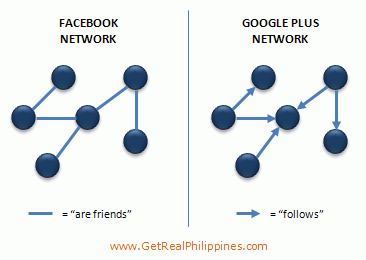It’s been one week since I first jumped into the Google+ bandwagon and published my initial thoughts about it. My observations from that piece haven’t changed — basically Google+ is the Facebook sharing experience wrapped around a Twitter-like networking philosophy. In that sense, Google+ is a true “mash-up” — a Facebook-Twitter hybrid that seems to have achieved where a lot of do-it-all contraptions don’t do very well, which is do it all well. And because I use an Android smartphone, Google+ easily slipped into my mobile world’s ecosystem without much dramas.

One thing that Google+ so far does not have is the equivalent of Facebook’s “Pages” feature. This was originally the “fan” page before the concept of becoming a fan of a Page was dropped in favour of the more politically-correct term of “liking” said pages (and most other doo-dads brokered within the Facebook “platform”). The thing that differentiated Facebook Pages from a conventional user account (apart from Pages being able to accomodate more than 5,000 user connections) is that it is an opt-in artifact; that is, you cannot rope people into them (the way one can add people to Facebook Groups).
| SUPPORT INDEPENDENT SOCIAL COMMENTARY! Subscribe to our Substack community GRP Insider to receive by email our in-depth free weekly newsletter. Subscribe to our Substack newsletter, GRP Insider! Learn more |
With Google+, every member is functionally a Facebook Page and an opt-in proposition for others. We don’t propose “friendships”. We “add” people into circles and hope others, in turn, will add us into theirs. To paraphrase what I wrote earlier, it’s Twitter networking on a Facebook-like platform (in both senses of that italicised phrase).
So whereas…
(1) In Facebook and, before it, Friendster and MySpace, two users are simply one another’s “friend”;
(2) In every relationship unit in Google+ (as it is in Twitter), one user is the followed and the other is the follower.
Links between network nodes in a Google+ network represent a one-way street (and not a two-way street such as in a conventional “friendship” in Facebook). There is an ordinate-to-subordinate relationship between network links in Google+. A network diagram describing a Facebook network will only require a simple line connecting each node in the network. In Google+ (and in Twitter), the connecting line is necessarily directional — an arrow — showing, say, the line originating from the follower node and terminating with an arrowhead pointing into the followed node.

Bottomline for me spells something quite ominous for Facebook and Twitter. Google+ combines both well. That emerging reality plus the ease with which such platforms can now be run on most mobile devices could render Facebook and Twitter redundant to the average user. It is likely to come down to one question:
Why should I maintain three separate accounts on three separate networks when one of these networks can do what the other two does?
And, yes, tech pundits, journalists, and so-called social media “mavens” have been milking the Google+ hype for several weeks now, so if you can’t beat ’em, join ’em.
- Blocking Grok and other AI chat apps in the Philippines is a good idea - January 16, 2026
- The ultimate theory on why woke people are such mental cases - January 10, 2026
- The curious case of Filipino communists’ condemnation of the US attack on Venezuela and their support for Nicolás Maduro - January 6, 2026
And groups too. Google+ has to work on its own version.
We cannot also like comments and posts yet. But it has features I lurv.
its more like Twitter + Tumbler with a very well thought-out access level system. Its far easier to manage what you share with different social circles.
the only thing missing is the option to do full blogging and photo album sharing and i’m all ready to ditch all my old social networking accounts
yes you can! actually its an easy task linking my Picasa Photo Album to g+
goodbye facebook. i hate privacy setting of fb
You can share albums and even tag photos. I just did.
You can also tag someone in your post and make it exclusive between you and that person and any other member.
Yes, I think Google are quite focused on privacy features after a few fiascoes in past attempts to break into the social media business.
Google+ loves to ban people they perceive as fake, though.
I like Google+ It makes it easy for me to follow people and them to follow me without needing to add them. You can use an alias in your Google + profile provided you give your real name when you sign up. You have the option to use your real name or an alias that you chose for the public.
Please also do not discount how easy it is to build a web presence using Google+. If you want to reach a crowd, build a product etc. Google+ is excellent for that. FB is now addressing that issue with their subscribe feature and Timeline but with timeline its looking my spacey now. Also, the Timeline feature just proved that FB has all your information. I’m sure G+ also has it too but they seem better at privacy than FB.
And don’t forget…Google+ Hangout. Why isn’t anyone utilizing that feature effectively? It’s great!